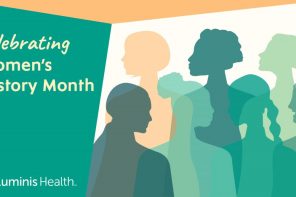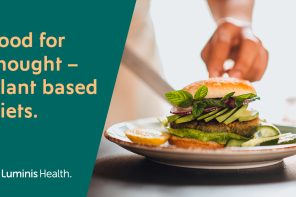Most of us know that good nutrition is important for good health. However, when we hear catch phrases like “calcium deficiency” or learn a new multivitamin just hit the shelves, it can make us wonder if we are getting enough vitamins and minerals. Do we really need to take additional doses?
First, let’s talk about these nutrients. There are 13 vitamins – vitamin C, A, D, E, K and the B vitamins. Vitamins help your body grow and work the way it should. Minerals have different jobs in which they help you resist infections, keep your nerves healthy and help your body get energy from food. By following the MyPlate guidelines, a nutrition guide published by the USDA Center for Nutrition Policy and Promotion, you will get enough of most of what you need from food.
In addition to a balanced diet, some people may need nutrient supplements depending on their situation. For example, older adults, pregnant women and people who are food insecure are at increased risk of nutrient deficiencies. Some individuals are limited in their food choices because of allergies, special diets, medical conditions, intolerances or because they are following a vegetarian or vegan diet. For example, animal foods are the main source of vitamin B12. So people who follow a vegan diet need to eat fortified foods and or take a supplement.
Vitamin D might be a concern among infants, children and young adults, especially for those that do not drink milk. Therefore, they will likely need a supplement. Adolescent girls, meanwhile, may need more iron. As people age, it can be difficult to get enough vitamin B12. Getting B12 from fortified foods or taking it as part of a multivitamin can help raise B12 in our blood. As we get older, our bodies are not as skillful at absorbing certain nutrients. B12 is one of those.
READ MORE: What you eat can affect your mental health
On the other hand, real food contains healthy components a pill can’t give us. Plant foods have thousands of beneficial plant substances called phytochemicals that interact with one another in many ways, some of which scientists may not even understand yet. The greater the food variety, the more the potential beneficial interactions. When we get nutrients from a pill, we lose the fiber in these foods and, according to studies, these vitamins also fail at preventing cancer, dementia, heart disease or Type 2 diabetes. People who eat foods rich in those vitamins instead of going for pills only are at less risk of these diseases.
Nutrients work synergistically, meaning you need the right balance of nutrients. A deficiency in one might appear as, or worsen, a deficiency in another. For example, vitamin E enhances vitamin A absorption. Vitamin A and E together lead to increased antioxidant capabilities, protect against some forms of cancer and support a healthier gut. Zinc is required for vitamin A transport, while vitamin C aids in iron absorption. This is only a snapshot of the many nutrient interactions happening in our bodies and their co-dependencies.
Your doctor can order tests to help determine if taking a supplement would be good for you. A registered dietitian can evaluate your diet and make recommendations to meet your personal needs given your food preferences.
As always, check with a health care professional to see which vitamins and minerals you may need and how to best take them. Remember, eating a balanced diet mainly consisting of fruits and vegetables is the first step towards the right direction.
Ann Caldwell and Maureen Shackelford are nutritionists and registered dietitians at Anne Arundel Medical Center. To reach them, call 443-481-5555.




